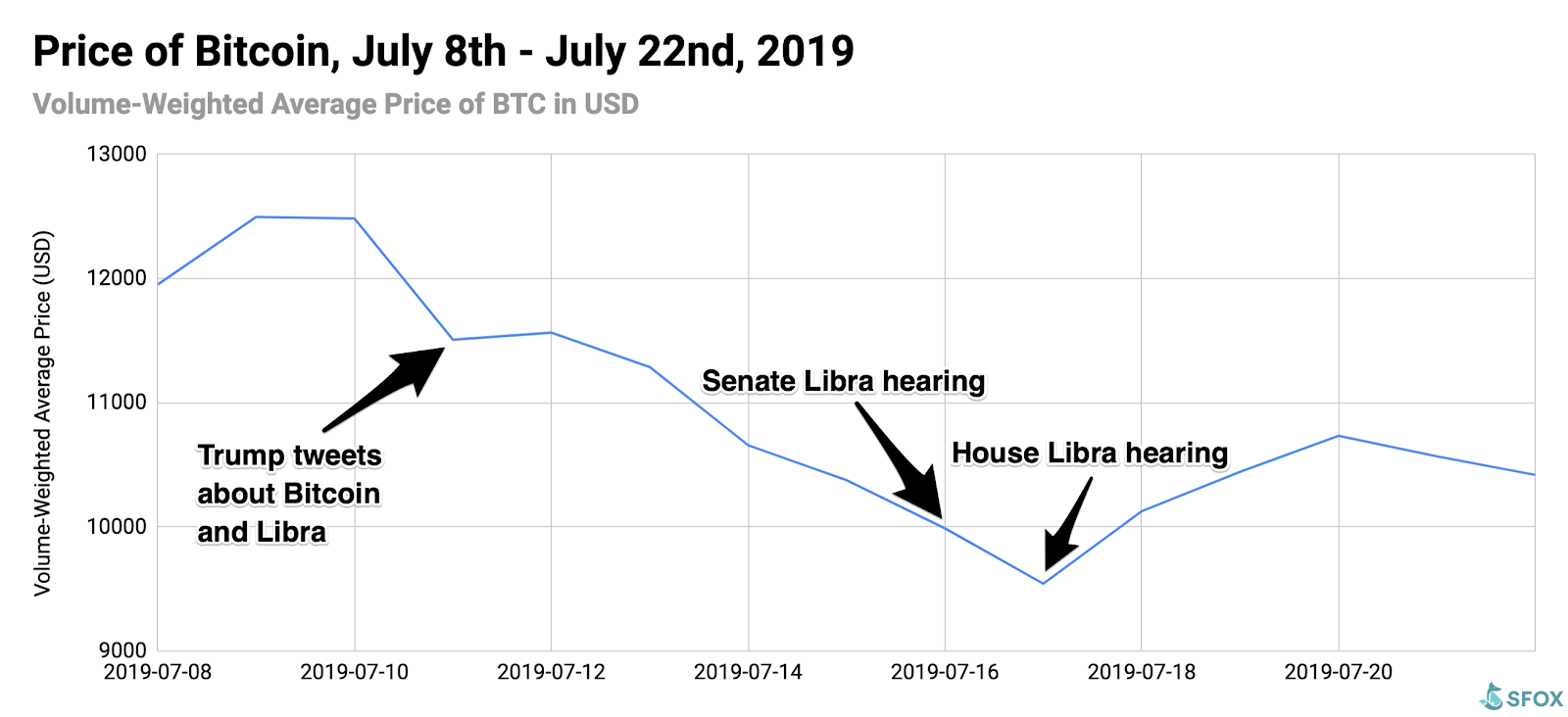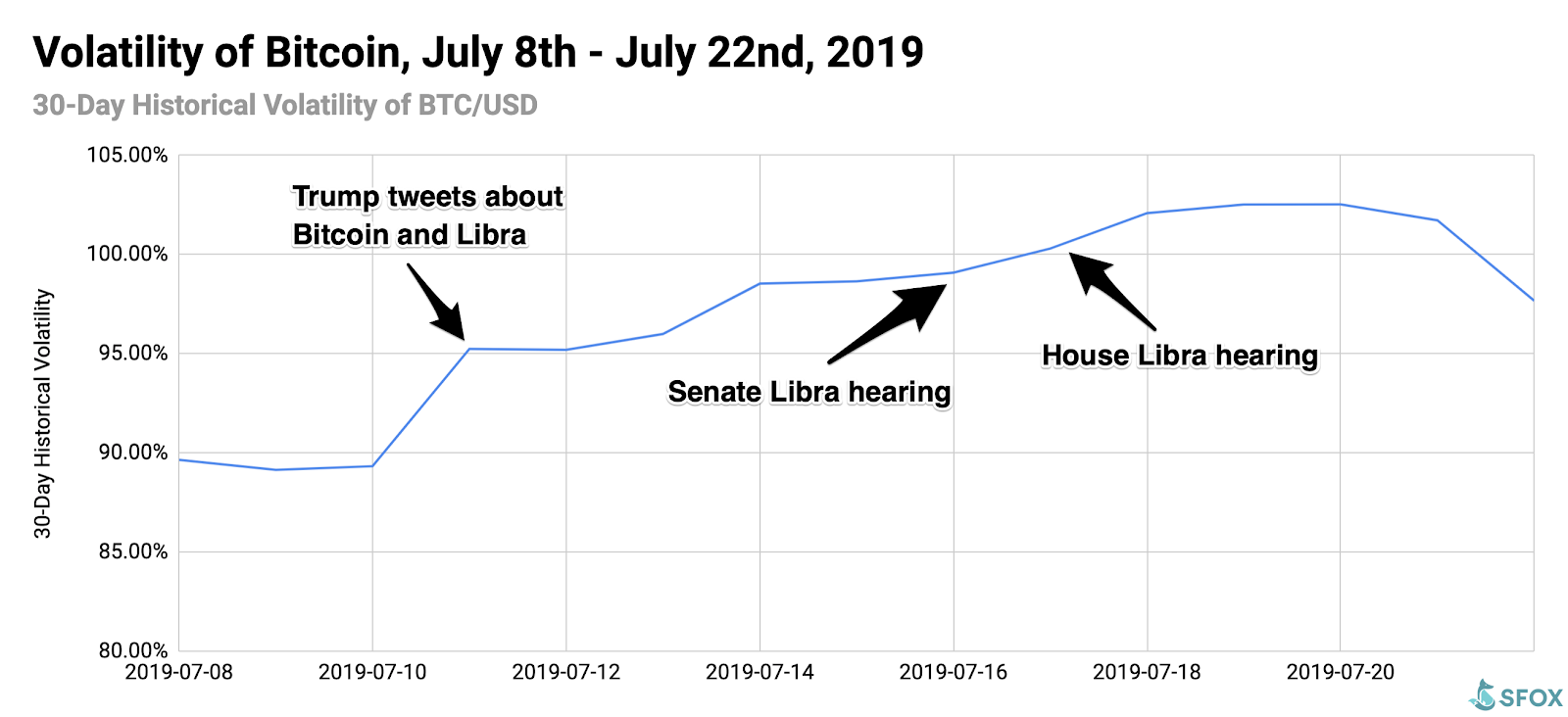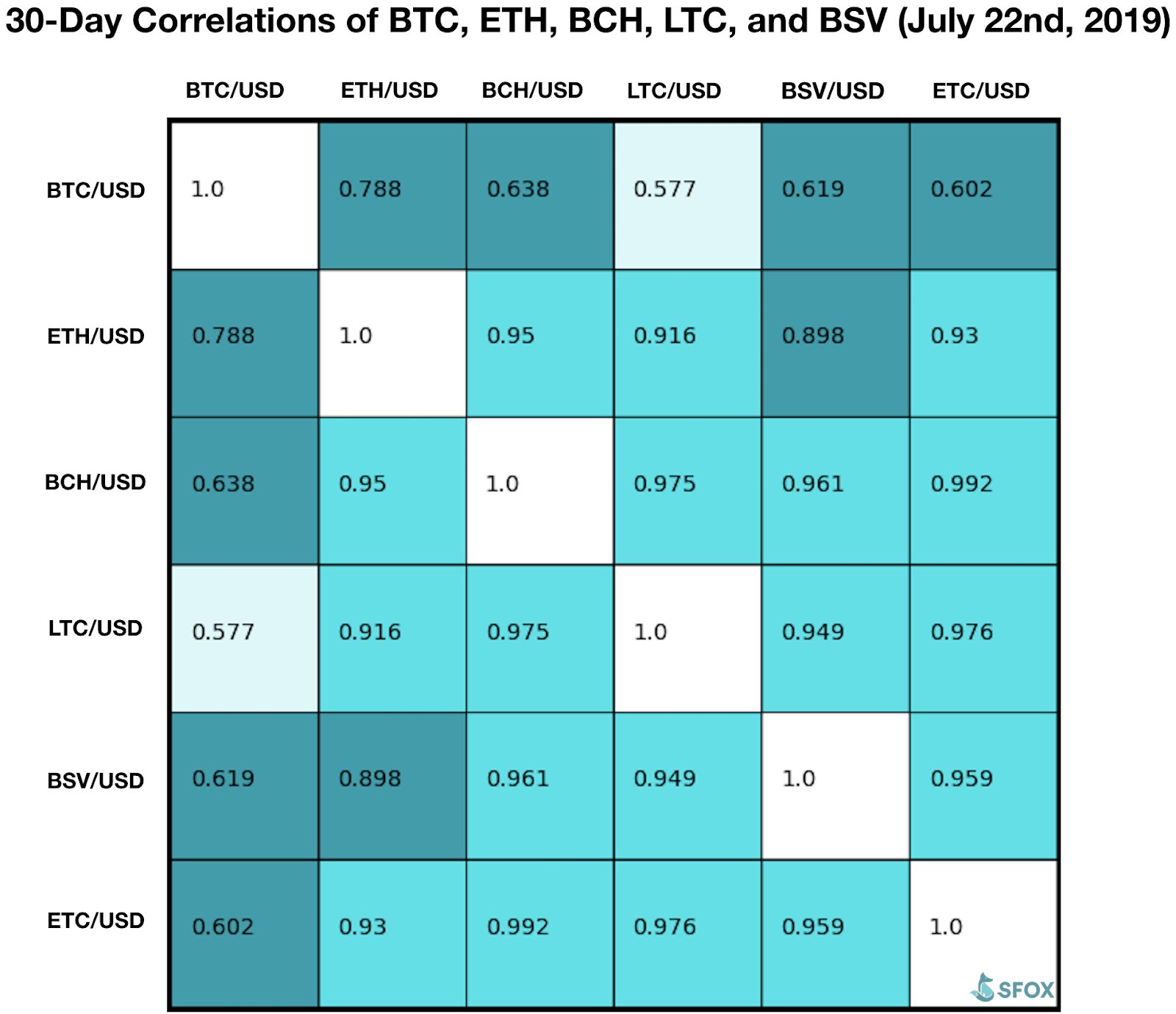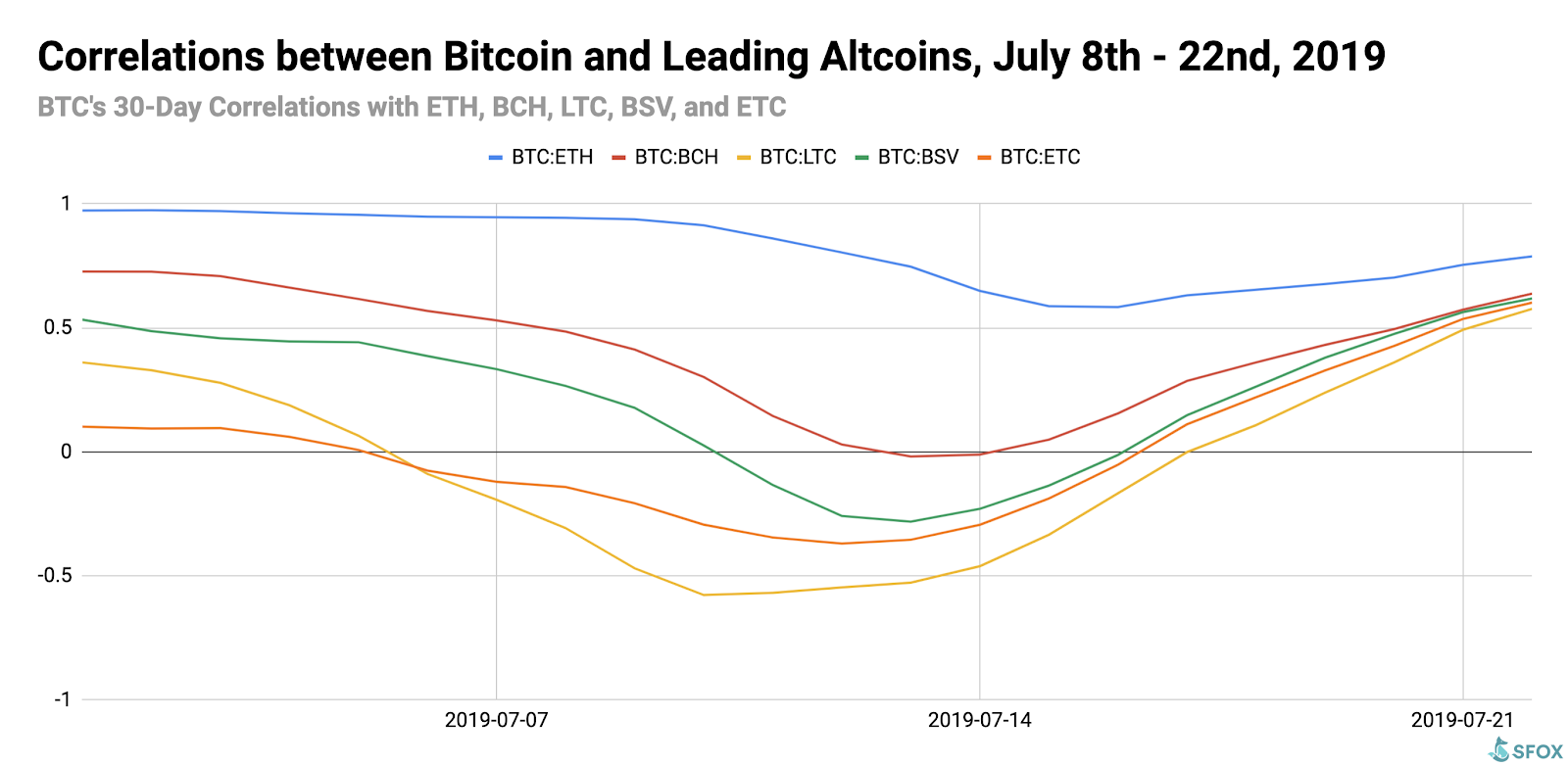HodlX Guest Post Submit Your Post
Summary
Crypto correlation data following Trump’s Bitcoin comments and the Facebook Libra hearings suggest that the market at large still cares more about Bitcoin than altcoins – and that it may no longer be accurate to classify Ethereum as an “altcoin.”
The cryptocurrency that may not be a cryptocurrency has put Bitcoin back in the mainstream media over the past few weeks – and coin relationships within the crypto sector have shifted dramatically.
Capitol Hill has been abuzz over Facebook’s crypto initiative, Project Libra, which aims to provide billions of people worldwide with access to a cryptographically secured currency managed by a consortium of industry giants such as Uber, Booking.com, and Visa.
On July 11th, five days ahead of scheduled Senate and House hearings on Libra, President Trump felt compelled to issue a presidential tweet about Bitcoin and Libra.
I am not a fan of Bitcoin and other Cryptocurrencies, which are not money, and whose value is highly volatile and based on thin air. Unregulated Crypto Assets can facilitate unlawful behavior, including drug trade and other illegal activity….
— Donald J. Trump (@realDonaldTrump) July 12, 2019
….Similarly, Facebook Libra’s “virtual currency” will have little standing or dependability. If Facebook and other companies want to become a bank, they must seek a new Banking Charter and become subject to all Banking Regulations, just like other Banks, both National…
— Donald J. Trump (@realDonaldTrump) July 12, 2019
…and International. We have only one real currency in the USA, and it is stronger than ever, both dependable and reliable. It is by far the most dominant currency anywhere in the World, and it will always stay that way. It is called the United States Dollar!
— Donald J. Trump (@realDonaldTrump) July 12, 2019
The hearings on July 16th and 17th didn’t just analyze Libra on its own terms: lawmakers also demonstrated acumen in differentiating Libra from Bitcoin. In her expert testimony before the U.S. House Financial Services Committee, CoinShares CSO Meltem Demirors repeatedly emphasized her view that Libra isn’t a cryptocurrency at all.
“What [Facebook] is attempting to do is not to create a new payment system. What they’re attempting to do is to pass off this idea as a cryptocurrency, which it is not. They’re attempting to use regulatory cover to get away with doing something that would typically be regulated, which is asset management. It’s fundamentally different [than Bitcoin].”
This corresponded with a curious market situation. Despite not being the direct focus of lawmakers’ attention, Bitcoin became more volatile and more dominant in the overall crypto market.
The price to buy Bitcoin has fallen somewhat consistently since the start of the US government’s scrutiny of Libra, from $12,483.97 on July 10th (before Trump’s tweet) to $9,543.13 on July 17th (the day of Libra’s congressional hearings) – a decrease of almost 24%.
In the same timeframe, the volatility of Bitcoin steadily increased, from 89.33% on July 10th to 100.30% on July 17th – the first time Bitcoin’s 30-day historical volatility has surpassed 100% since March 6th, 2018.
One possible explanation for this combination of downward trend in Bitcoin’s price and upward trend in Bitcoin’s volatility is that the market doesn’t fully understand what implications the increased government scrutiny towards a private blockchain and cryptocurrency (i.e. Libra) may have for public blockchains and cryptocurrencies (e.g., Bitcoin). This kind of uncertainty is understandable given the wide range of Bitcoin-related comments surrounding Libra. On the one hand, the President of the United States has denied that Bitcoin is money and has said that he is “not a fan” of it; on the other hand, Congressman Patrick McHenry (R-NC) called Bitcoin “an unstoppable force” which Congress should not attempt to deter.
The latest crypto correlation data collected by the SFOX research team reinforces that Bitcoin has occupied center stage in the crypto sector amidst this Libra scrutiny. Leading altcoins – Ether (ETH), Bitcoin Cash (BCH), Litecoin (LTC), Bitcoin SV (BSV), and Ethereum Classic (ETC) – were all less correlated to BTC than they have been in recent months, whereas they were all highly correlated to each other.
Longitudinal correlation data from July 1st through July 22nd show a pattern of BTC:altcoin correlations dipping throughout the middle of the month, with all correlations converging towards mid-positive values at present. (Note that the BTC:ETH correlation has settled at a more positive value than other BTC:altcoin correlations: 0.788 vs. ~0.6.).
These correlation data reinforce the idea that investors and traders may still be much more attuned and responsive to Bitcoin rather than other altcoins, especially when the crypto sector enters the national regulatory spotlight. This may also, to an extent, be a self-fulfilling prophecy: some investors and traders may believe that regulators will address and clarify laws specifically surrounding Bitcoin before they turn their attention to crypto as a whole, and may, therefore, be focusing more on Bitcoin than altcoins as such regulatory discussions take place.
We’ve also seen this “dominance” of Bitcoin reflected in the percentage of crypto’s total market cap, climbing from roughly 50% in March to between 65% and 75% today, depending on data source.
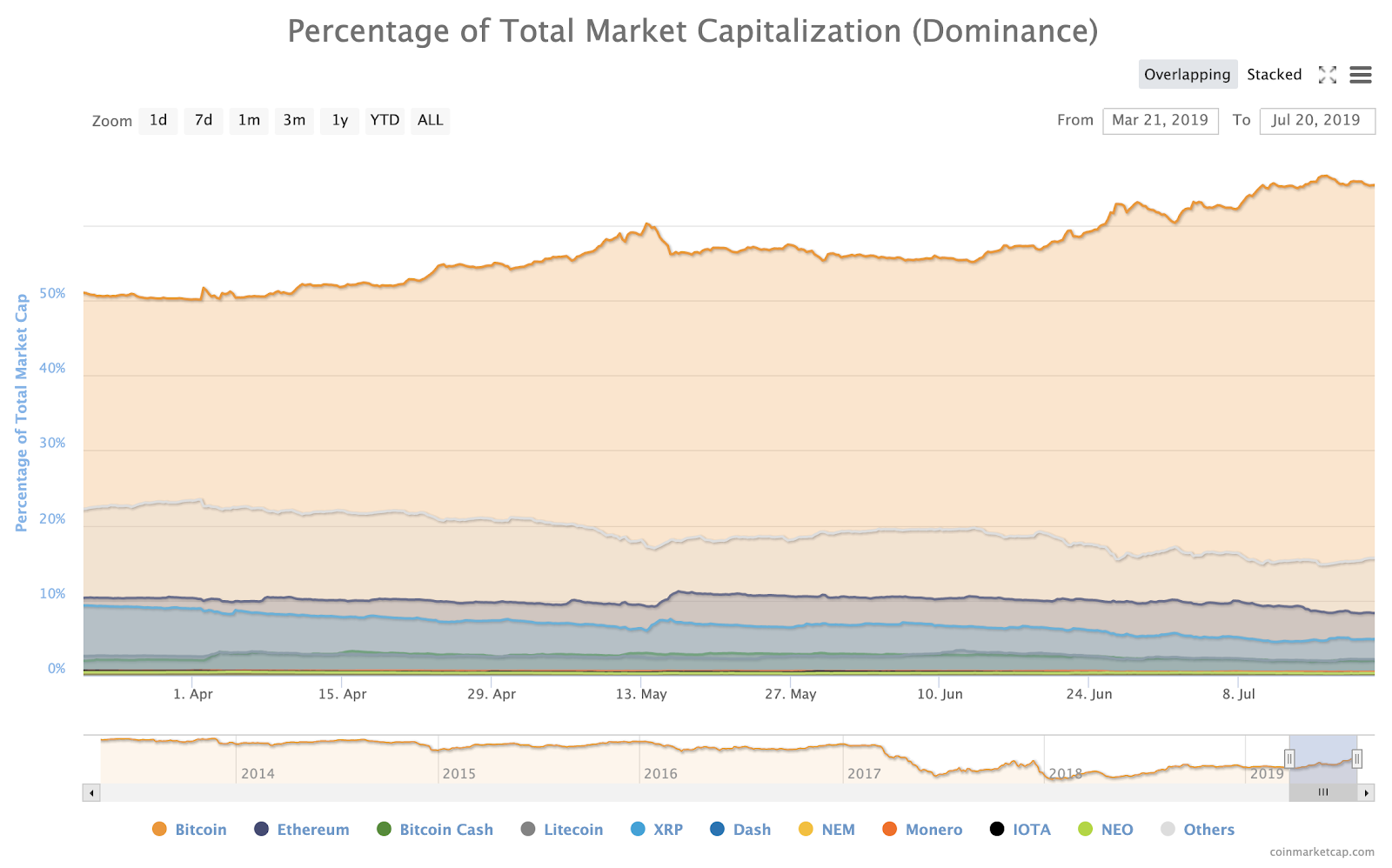
Increase in Bitcoin’s market dominance over the last four months. Source: CoinMarketCap.
While many sources have noted the increase in Bitcoin’s market dominance, few have observed the fact that BTC’s current correlation with Ether (ETH) is markedly higher than its correlations with other altcoins, and has been so throughout the month of July. This may support the idea that Ethereum is coming into its own as a blockchain that is publicly recognized as an asset on its own terms, much like Bitcoin. If this trend continues, it may become inappropriate to categorize Ethereum as an “altcoin” on a par with other cryptoassets that are not Bitcoin.
As the crypto sector continues to evolve and garner public attention, it stands to reason that prominent projects besides Bitcoin will come to be understood and evaluated on their own terms. It’s possible that, with Ethereum, we may be seeing the beginning of that next stage in crypto.
You can check out the original SFOX New Correlation Data Report here.
Follow Us on Twitter Facebook Telegram




